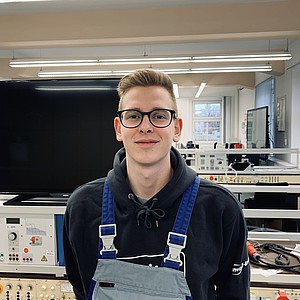G
Word has already spread about the digital teaching of Professor Kornhuber from the Faculty of Electrical Engineering and Computer Science. His students are simply thrilled. And so is the professor.

"In the summer semester, I have the privilege of accompanying 14 students in the high-voltage engineering module," says Prof. Dr.-techn. Stefan Kornhuber. His subject area is high-voltage engineering and theoretical electrical engineering. "We're holding lectures as usual," he says, "but now in a slightly different format due to the coronavirus pandemic." Lectures will take place via Microsoft Teams, i.e. in video conferences at the usual times. "So that the students' daily rhythm is maintained." Of course, certain things are different when you only meet digitally. Kornhuber's digital teaching was also inspired by the flipped classroom method. The content is prepared by the students. Some of the students form the expert group that evaluates the prepared content. This often results in fruitful discussions. "I'm not the content provider," says Kornhuber, "I'm the moderator."

Kornhuber says that the challenge is now to implement the former blackboard images with the help of online tools and to teach and learn with them. Even with the changed framework conditions: in the absence of a "missing blackboard", the expert groups created posters and slides in PowerPoint. This required attention, guidelines and discipline from everyone involved. "The amazing thing is the disciplined, professional and highly motivated approach of the students," says the professor. It is fascinating to see the flexibility that digital teaching brings compared to the real world. "Communication is much more active." It was important to Kornhuber not to deliver anything out of the box, as he says. Rather, to remain in a live discussion area, to offer teaching at the usual times, not at the blackboard, but via the online channel. "That's my job. I don't do anything special. The biggest thanks go to my students."
We asked two students what makes Professor Kornhuber's digital teaching special for them, what they like about it and what difficulties digital teaching can also bring.

Since our faculty and especially our matriculation takes almost all modules with a digital version, we can compare Prof. Kornhuber's teaching very well with other plans and processes.
I think the use of MS Teams is particularly noticeable, which makes the process much more relaxed for us, as files can be easily exchanged, lectures can be designed with interactivity and students can also create their own groups.
This is a welcome change, as only one tool really needs to be used for the lecture and not countless different ones such as Webex, BBB, filr, OPAL, etc.
Interactivity was also the right keyword here, as Prof. Kornhuber values student participation like no other professor. In the high-voltage engineering module, for example, the original plan was to create posters and associated lectures on various topics. However, we now did these almost unchanged in teams, which took some getting used to, but for me, for example, was very instructive for future work in the company.
Prof. Kornhuber also "enforces" questions among the students, which in turn are used to generate the examination questions. This makes the synergy between professor and students really pleasant, as the whole subject is more like a large group of experts, in which Prof. Kornhuber imparts the most knowledge.
In addition, only High Voltage Engineering has succeeded in carrying out the numerous practical courses digitally (in preparation for the upcoming face-to-face courses) together with the other lecturers.
Overall, it is the very extensive feedback from discussions on questions that Prof. Kornhuber obtains that sets him apart from the other lecturers. In summary, it simply feels most like a conventional face-to-face course with a lot of student involvement.
I have deliberately omitted the professor from the question, as my points do not relate directly to Prof. Kornhuber, but to digital teaching in general.
For me, the interaction between lecturers and students is particularly important, which sometimes feels strange in online teaching, as it is possible to simply remain silent, which is not possible in a face-to-face course.
In addition, the pace is often too fast in all courses, as the professors cannot check whether the students are still writing or similar, but most of them also get feedback on this.

For me, the strengths of the course include 5 points:
G